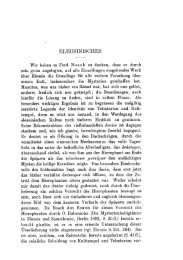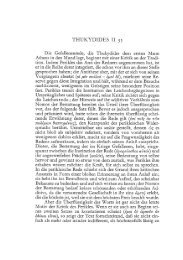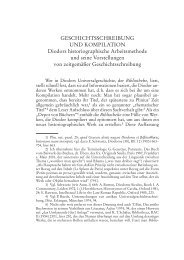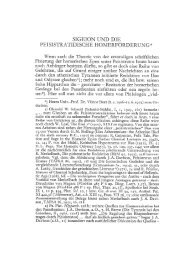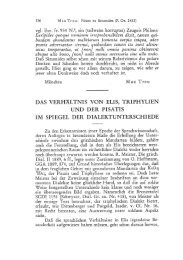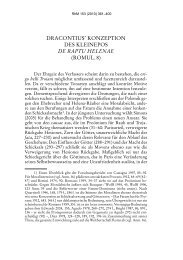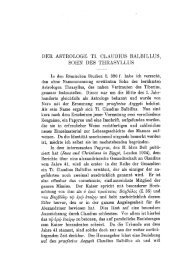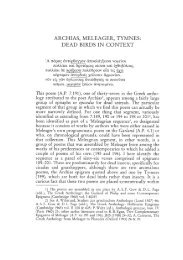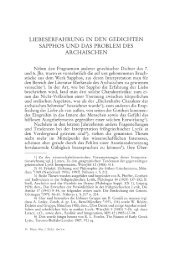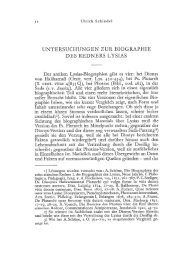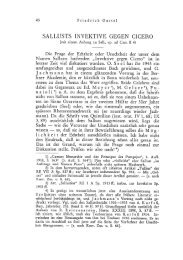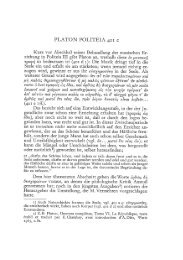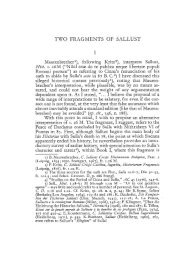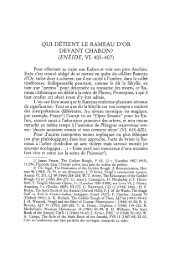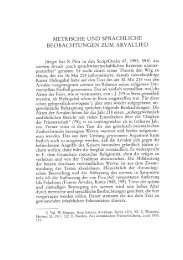WORDS FOR 'PROSTITUTE' IN LATIN
WORDS FOR 'PROSTITUTE' IN LATIN
WORDS FOR 'PROSTITUTE' IN LATIN
Create successful ePaper yourself
Turn your PDF publications into a flip-book with our unique Google optimized e-Paper software.
<strong>WORDS</strong> <strong>FOR</strong> <strong>'PROSTITUTE'</strong> <strong>IN</strong> LAT<strong>IN</strong><br />
Few objects attract as many names as the prostitute. In the<br />
following pages I have discussed weIl over 50 genuine, partial or<br />
alleged synonyms of meretrix, and there is no reason to assume<br />
that my list is exhaustive for recorded Latin, or that there were not<br />
other wörds in use which have not survived. The gloss ceL<br />
V.636.17 ('ouariolus puer lenonis sic dicitur', cf. IV.135.7) provides<br />
a hint of the gaps in our evidence. That the slave of a leno<br />
should be called 'keeper, attendant of the eggs' does not of course<br />
mean that lenones spoke of their girls as oual), but the term does<br />
suggest that in the slang of brothels colourful and humorous expressions<br />
might have been heard.<br />
The reasons for the richness of the vocabulary applied to<br />
whores in Latin (and any language) are various. Sexual behaviour,<br />
like the sexualorgans, generally inspires euphemisms. Since euphemisms<br />
tend to become offensive themselves, they are often<br />
replaced. Secondly, whores are not a homogeneous dass. They<br />
differ in social dass, in their methods of soliciting, and in the<br />
services which they offer, and these differences may be reflected<br />
lexically. The numerous methods of soliciting adopted by ancient<br />
prostitutes fumish many of the terms in Latin. Thirdly, prostitutes<br />
provoke diverse reactions. The moralist who is outraged by<br />
prostitution is unlikely to use the same terminology as the scortator<br />
who feels affection for some members of the profession. Some<br />
words and expressions of moral condemnation will be discussed<br />
below.<br />
I<br />
Meretrix and Scortum<br />
The two most common words for 'prostitute' in Latin were<br />
scortum and meretrix. In this section I discuss the use and distribution<br />
of the pair.<br />
1) One of the funetions of such slaves in brothels is indieated at Fest. p. 20<br />
'aquarioli dieebantur mulierum impudiearum sordidi adseeulae'. The water was<br />
for washing after intercourse (see Cie. Cael. 34). Perhaps ouariolus is merely a<br />
eorruption of aquariolus (see TLL IX.2.1187, 52 ff.).<br />
21 Rhein. Mus. f. Philol. 126/3-4
322 J. N. Adams<br />
Scortum originally meant 'leather, hide' (Varro Ling. 7.84;<br />
for a word play see Apul. Met. 1.8 'qui uoluptatem ueneriam et<br />
scortum scorteum Lari et liberis praetulisti'). According to Donatus<br />
(on Ter. Eun. 424: 'abdomen in corpore feminarum patiens<br />
iniuriae coitus scortum dicitur') the word was used of the female<br />
pudenda; if this were true it would thence have been transferred<br />
pars pro toto to loose women. So cunnus was sometimes used pars<br />
pro toto (Hor. Sat. 1.2.36, 1.2.70, 1.3.107), as indeed various<br />
words for 'penis' (e.g. uerpa, CIL IV.1655, mentula, CIL<br />
IV.7089) and 'anus' (fossa, Juv. 2.10) were used of disreputable<br />
men. For the application of a word of this semantic field to the<br />
female parts one might compare bulga, 'leather bag' (Fest. p. 31<br />
'bulgas Galli sacculos scorteos appellant') at Lucil. 73 ('in bulgam<br />
penetrare yilosam'), but it was probably the shape rather than the<br />
material 0 the object which was primarily in Lucilius' mind. For<br />
an implied use of a word meaning 'skin' in reference to a bodily<br />
orifice with sexual significance, cf. Cato Grat. frg. 60 '< inter- ><br />
cutibus stupris obstinatus', Gell. 13.8.5 'intercutibus ... uitiis<br />
madentes', Fest. p. 98 'inter cutem flagitatos dicebant antiqui mares,<br />
qui stuprum passi essent'. Inter cutem and intercus literally<br />
mean 'under the skin' (> 'internai'?), but used of a stuprum 'under<br />
the skin' (pedicatio) it would have been the anus which was suggested,<br />
at least to some hearers.<br />
However scortum was from the time of Plautus the standard<br />
word for 'male prostitute' as welF). To explain this usage one<br />
would have to suppose that, if scortum had once been an anatomical<br />
term, it had been applied to apart of the male as well as apart<br />
of the female. An alternative hypothesis would be that once scortum<br />
had lost its association with the female pudenda, it came to be<br />
used of male whores. On balance it seems advisable to reject<br />
Donatus' explanation, especially since scortum is never attested<br />
elsewhere as an anatomical term.<br />
It seems more likely that whores were called 'hides, leather'<br />
partly because of the character of the materiaP), and more particularly<br />
because an association was felt between the working of<br />
2) Plaut. Cure. 473, Poen. 17, Cie. Dom. 49, Sest. 39, Phil. 2.44, Justin<br />
30.2.2, Petron 9.6, 119line 25, Aure!. Viet. Caes. 28.6<br />
3) See M. Hammarström, 'De uoeibus seoni, serattae, strittabillae', Eranos<br />
23 (1925), PI;>' 104ff., and espeeially p. 108: 'in seorti ... uoeabulo ad mutationem<br />
signifieationIs effieiendam non materia superfieiesque pellis ualuit, sed detraeta<br />
pellis per se, ut erat laxa, mobilis, ineomposita'. Hammarström quotes parallel<br />
usages from other languages (see further below).
324 J. N. Adams<br />
has merely been fondled. So at Pers. 227 the ancilla Sophoclidisca,<br />
who lays hands on the slave Paegnium to remove something from<br />
hirn (ib. 'habes nescioquid'), is told 'ne me attrecta, subigitatrix'.<br />
She takes the words in a sexual sense ('sin te amo?'). Clearly one<br />
who subigitat does no more than touch. The metaphorical use of<br />
subigito in Plautus is likely to have been based on the sense 'master,<br />
force to one's will' which subigo (and presumably subigito)<br />
possessed (at Suet. I ul. 49.4 it is clear from the context that subigo<br />
= pedico is a metaphor of mastering). It does not seem plausible<br />
that the act of fondling gently should have been likened to the<br />
working of leather.<br />
If scortum = 'prostitute' derived from a metaphorical application<br />
to sexual behaviour of the phrase scortum subigo (subigito),<br />
then subigo (subigito) 'knead, work' in that phrase would certainly<br />
once have had to imply the act of sexual intercourse: the distinctive<br />
act which is committed with a whore is not fondling but<br />
intercourse. It is therefore curious that in extant old Latin metaphorical<br />
subigito suggested mere touching. Unless subigito in its<br />
sexual application had undergone an amelioration of sense, the<br />
phrase scortum subigito (subigo) could have played no part in the<br />
semantic change of scortum. The second explanation given above<br />
of the change of meaning is plausible enough, but Plaut. Mi/. 652<br />
should not be cited along with Fest. p. 443 as if both display the<br />
same use of the verb.<br />
Meretrix ('woman who earns, paid woman', < mereo; cf.<br />
mereo at Gell. 2.18.3) can be compared with quaestuaria (Sen.<br />
Ben. 6.32.1 'ex adultera in quaestuariam uersa'), mulier quaestuaria<br />
(Dig. 23.2.43.7 'lenas autem eas dicimus, quae mulieres<br />
quaestuarias prostituunt'), corpora quaestuaria (Dig. 23.2.43.9 'si<br />
qua cauponam exercens in ea corpora quaestuaria habeat's), and<br />
also meritorius, which at Cic. Phi/' 2.105 ('ingenui pueri cum<br />
meritoriis, scorta inter matres familias uersabantur') serves as a<br />
masculine correspondent to meretrix (cf. Servo Virg. Ecl. 8.29<br />
'meritorii pueri, id est catamiti'), but is usually adjectival and<br />
applied superfluously to scortum (Suet. Claud. 15.4, Tert. Nat.<br />
2.10.1, p. 113.10, Arnob. Nat. 1.28, p. 18.26).<br />
The difference of tone between scortum and meretrix can be<br />
5) This use of corpus (cf. Ovid Tristia 2.311 'corpora Vestales oculi meretricia<br />
cemunt') is of course based on turns of phrase such as 'to earn a living by one's<br />
body'; e. g. Plaut. Poen. 1140 'facerentque indignum genere quaestum corpore',<br />
Bacch. 863 'illam, quae corpus publicat uolgo suom', Dig. 38.1.38 'quamuis adhuc<br />
corpore quaestum faciat'.
Words for 'Prostitute' in Latin 325<br />
seen in Plautus. Scortum was the more pejorative word, as can be<br />
deduced from the collocations in which the two terms were used.<br />
Both are common (scortum 44 times, meretrix 63). Scorta are<br />
often not the named characters in the plays, but the undifferentiated<br />
harlots who might participate in a temporary liaison at dinners,<br />
or be taken off somewhere for sexual purposes. Scortum is<br />
often translatable with an indefinite article in English, or else it is<br />
in the plural. A distinction can be made between whoring as a<br />
practice pursued by men with no lasting interest in the object of<br />
their attention, and the association, often prolonged, with an individual<br />
prostitute with whom the man might be in love. The<br />
object of the first relationship was a scortum (hence the general<br />
verb scortari, 'to chase after harlots'), and of the second a meretrix<br />
(meretricor is scarcely attested)6). Hence scortum ducere is a common<br />
phrase in Plautus (9 times) in the sense 'take a whore' (temporarily<br />
for sexual purposes; the name of the woman is usually<br />
not specified)\ but meretricem duco does not occur. 'Taking a<br />
whore' was a relaxation particularly associated with eating and<br />
drinking. In the context of symposia scortum (unlike meretrix) is<br />
frejuent, often juxtaposed with references to eating and drinking<br />
). The word is also commonly found in such contexts in other<br />
writers 9 ).<br />
Meretrix on the other hand is found 6 times 1o ) as the object of<br />
verbs such as amo (cf. HoT. Sat. 2.3.252), whereas scortum is not<br />
used in such collocations by Plautus. It is obvious that meretrix<br />
was more neutral and unemotive in tone, and that scortum was the<br />
'marked' term of the pair. Although the etymology of meretrix<br />
was transparent, and although it was the vox propria in contexts<br />
dealing with the earning of money by means of sexII), it is frequently<br />
(unlike scortum) used of the named prostitutes of such<br />
6) Not that meretrix eould not be used of a low whore (e. g. Suet. Dom. 22<br />
uulgatissimas meretrices). If so one would usually expeet its tone to be speeified by<br />
an adjeetive, or by some indieation in the eontext.<br />
7) The implieation of ducere in this expression iso illuminated by CIL<br />
IV.2450, quoted below p. 347.<br />
8) E. g. Men. 170,476, 1142, Mi!. 652, Most. 36; at Men. 476 and 1142 (cf.<br />
Bacch. 1189, Pseud. 1271) it is in the phrase scortum accumbere; meretricem accumbere<br />
does not oeeur.<br />
9) E.g. Cie. Cat. 2.10, Sall. Cat. 7.4, Livy 23.18.12, 23.45.2, Suet. Nero<br />
27.2, Apul. Met. 8.1, Apol. 98.<br />
10) See G. Lodge, Lexicon Plautinum (Leipzig, 1924-33), 11, p. 45a. 4<br />
11) E. g. Caeeil. 214, Turpil. 42, Plaut. Truc. 228 ff., 568,572 f., Rud. 56,<br />
541.
326 J. N. Adams<br />
importance in New Comedy, who of course were often 'good'<br />
and the object of romantic attachments 12 ).<br />
Various other passages illustrate the tone of seortum. The<br />
difference, for example, between 'taking a whore' and 'having a<br />
girl friend', amiea (a more permanent relationship) is particularly<br />
clear at Mere. 923-5 ('mater irata est patri uehementer, quia scorturn<br />
sibi / ob oculos adduxerit in aedis, dum ruri ipsa abest: /<br />
suspicatur illam amicam esse illi'). Note too the contrast at Truc.<br />
678 ('uel amare possum uel iam scortum ducere').<br />
Much the same distinction of tone between scortum and meretrix<br />
can be observed in the speeches of Cicero. Seortum is used<br />
only 3 times in the singular, always with the sense 'male whore' in<br />
passages of vilification (Dom. 49, Sest. 39, Phi!. 2.44); its pejorative<br />
quality is clear from the adjectives populare and uolgare which<br />
are applied to it at Dom. 49 and Phi!. 2.44. The 5 plural exam}'les<br />
are in uniformly abusive contexts; they refer usually to undifferentiated<br />
harlots who are in the company of Cicero's opponents<br />
(Cat. 2.10,2.24, Har. Resp. 59, Mi!. 55, Phi!. 2.105). Meretrix on<br />
the other hand is usually in the singular, referring to specific prostitutes.<br />
Such meretriees are for the most part the regular purveyors<br />
of sex, who inhabit ordinary brothels and associate with<br />
lenones (e.g. Verr. 1.101,4.83, 5.38). Since prostitution is often a<br />
cause of moral indignation, meretrix can take on a pejorative tone<br />
from the context (e.g. Verr. 1.138,3.83); but it is sometimes used<br />
quite neutrally (note Dom. 111, 112 twice). The meretrix Chelidon<br />
who appears often in the Verrines (e.g. 1.137f.) was obviously<br />
no low whore but a woman of some sophistication.<br />
Seortum was not a vulgarism. The difference between seortum<br />
and meretrix was one of emotive content; botli had a place in<br />
educated Latin. Although Terence almost restricts hirnself to meretrix<br />
(24:2; the examples of seortum, at Adelph. 965 and Eun. 424,<br />
are in the phrases 'have, take a whore'), in various historians it is<br />
seortum which is preferred (by 2:0 in Sallust, 11:0 in Livy, 6:2 in<br />
Justin, 6:1 in Curtius Rufus, 4:0 in Tacitus, and 2:0 in Florus). The<br />
frequency of seortum in these writers must reflect the moralising<br />
tone of Roman historiography; historians, unlike writers of New<br />
Comedy, had occasion to speak of whores mainly in contexts of<br />
condemnation.<br />
Neither word is common in poetry. Horace preferred meretrix<br />
(10:2), but he did admit scortum once in the Odes (2.11.21;<br />
12) On 'good' prostitutes, see H. Herter, 'Dirne', RAe III.1173ff.
Words for 'Prostitute' in Latin 327<br />
meretrix is also found onee in the Odes). Ovid has only meretrix<br />
(7 times, but not in the Metamorphoses). Scortum is found onee in<br />
Lueilius (1271), Lueretius (4.1274), Tibullus (3.16.4) and Juvenal<br />
(3.135). Catullus has scortum and scortillum in the polymetries<br />
(6.5, 10.3), and meretrix onee in the elegiaes (110.7). The evidenee<br />
of poetry does not allow one to make a distinetion between the<br />
two words; it would seem that both were unpoetie, and largely<br />
avoided in all genres. Neither word is found in epie (if one excludes<br />
Lueretius).<br />
Meretrix (but not scortum) survived in the Romanee languages<br />
(e.g. OFr. meautris, Provo meltritz; it is the dissimilated<br />
form meletrix whieh provided the Romanee reflexes)13). By the<br />
time of the Latin Bible translations one ean see signs of the disappearanee<br />
of scortum, although it is not only to meretrix that it<br />
gives plaee. It is found only 8 times in the Vulgate, always in the<br />
O.T. This distribution suggests that it would not have been eommon<br />
in the Old Latin versions 14 ). Meretrix is found 39 times, 9<br />
times in the N.T. The glossing of scor[p]tum by lupanar at CGL<br />
II.592.34 suggests that the original meaning of the word tended to<br />
be forgotten (unless of course lupanar is amistake for lupana 15 );<br />
cf. however prostibulum = 'brothel', below, p. 331, and the semantie<br />
development of Eng. brothel, 'prostitute' > 'brothel'). Meretrix,<br />
not scortum, is the word regularly used in glosses for 'prostitute,16);<br />
this ean only be beeause the one word was eurrent in the<br />
late period, the other not.<br />
II<br />
Euphemisms<br />
It is possible that most words for 'prostitute' begin as<br />
euphemisms, in that they have a literal meaning whieh does not<br />
explieitly refer to any of the sexual aets in whieh whores might<br />
13) See W. von Wartburg, Französisches etymologisches Wörterbuch VI.2<br />
(Basel, 1967), 29 f.<br />
14) But for scortum in aversion of Gen. 38:21 see the edition of B. Fischer<br />
(Vetus Latina, Die Reste der altlateinischen Bibel, 11, Genesis, Freiburg, 1951-54).<br />
15) See E. Wölfflin, ALL 8 (1893), p. 9, J. v. d. Vliet, ALL 9 (1896), p. 303.<br />
16) E. g. CGL 11. p. XII, 577.28, 586.10, IV.256.7, 362.22, 535.29, 30,<br />
V.219.26, 308.43, 496.68, 502.38, 528.7, 552.10, 599.14, etc.
328 J. N. Adams<br />
engage, or to the body parts which they employ17). Nevertheless<br />
most languages develop one or more 'basic' words for 'whore',<br />
which in the minds of most speakers have lost any innocent sense<br />
which they might once have possessed: they imply 'woman who<br />
sells sexual intercourse', and have no other semantic associations<br />
to soften their impact. Meretrix, for example, originally contained<br />
no reference to sexual intercourse, since it meant only 'woman<br />
who earns'. But in the historical period there is attested no general<br />
use of the word: it had become inextricably associated with earning<br />
by means of intercourse. In Vulgar Latin, where the dissimilated<br />
forms meletrix and menetrix (see TLL VIII.827,41 ff.) became<br />
established, it lost its connection with mereo 1S ). Hence Nonius,<br />
who at p. 684 L. writes the form menetrix, derives the word<br />
from maneo (he presumably had in mind IlEVW): 'nam menetrices<br />
a manendo dictae sunt'.<br />
Basic words for 'whore' vary in tone, even though they share<br />
the characteristic of having (to most speakers) no other meaning.<br />
Harlot and whore, for example, are pejorative, whereas prostitute<br />
is legalistic and unemotive. Courtesan on the other hand suggests<br />
a grand and sophisticated associate of the wealthy. In Latin, as we<br />
have seen, meretrix was less pejorative than scortum.<br />
Alongside such basic terms, most languages possess a rich<br />
supply of euphemisms, some with a limited currency, others<br />
adopted off-the-cuff by individual speakers in appropriate circumstances.<br />
Once a euphemism becomes widely current in common<br />
parlance it is of course in danger of degenerating into a basic term:<br />
it will become so firmly associated with the object to which it<br />
alludes that it ceases to be euphemistic. The fate of a euphemism<br />
depends partlyon how transparent its original meaning iso If that<br />
onginal sense becomes obliterated by (e.g.) phonetic devel0rments<br />
(such as meretrix > meletrix) or changes in the lexicon 0 a<br />
language (e.g. the disappearance of the original meanings of harlot,<br />
'(male) vagabond', et. sim.), then the euphemism may become<br />
a basic term.<br />
17) Exceptions can of course be found. Note xaJl.aL1:v1rT/ (Sud. um) mv<br />
xaJl.ai 'XELJl.EvrJV 0XEvEo8aL), and various loan-words based on Lat. stuprum<br />
(which, though euphemistic, nevertheless referred to sexual intercourse): Ir. stripach,<br />
NIr. striopach, OFr. strupe (> Eng. strumpet?): see C. D. Buck, A Dictionary<br />
of Selected Synonyms in the Principal Indo-European Languages (Chicago<br />
-London, 1949), p. 1368.<br />
18) Similarly 1r6pVTJ, which began as a euphemism, developed a pejorative<br />
tone (unlike traipa): see Chantraine, (see above, n. 4), III. p. 888.
Words for 'Prostitute' in Latin 329<br />
. Euphemisms too have differing tones. Some words for 'prostitute',<br />
although they can be described as euphemistic in that they<br />
carry no explicit reference to sexual behaviour, nevertheless express<br />
moral disapproval or indignation (e.g. woman o/shame).<br />
Others allude to an activity, itself not inherently sexual, which<br />
may still be considered degrading (e.g. street walker); hence they<br />
may be strongly pejorative. Others may be absolutely non-condemnatory,<br />
at least in origin.<br />
In a sense then the distinction between 'basic term' (word<br />
with no other meaning) and 'euphemism' (a word which strictly<br />
could be taken in another sense) is unsatisfactory, since the basic<br />
term may be less offensive in tone than the euphemism (prostitute,<br />
though unambiguous, is less emotive than street walker, which is<br />
ambiguous).<br />
In this section I discuss the main types of euphemism for<br />
'prostitute' in Latin, as well as a few words which have been<br />
thought to have that meaning.<br />
A word for 'whore' may often refer to an associated activity<br />
or attribute of the woman, itself non-sexual. Many of the Latin<br />
words fall into this category. lt is particularly the method of soliciting<br />
19 ) which is mentioned in euphemisms of this type.<br />
A common method of soliciting was to sit in front of the<br />
brothel or cella in achair, sella 20 ). For 'sitting' used of whores, see,<br />
e.g. Ovid Pont. 2.3.20 'in quaestu pro meretrice sedet', Mart.<br />
2.17.1 'tonstrix Suburae faucibus sedet primis', 6.66.2 'famae non<br />
nimium bonae puellam, / quales in media sedent Subura', Tert.<br />
Cult. Fem. 2.12 'uisa est quaestui sedere'. For the sella of a prostitute,<br />
see Plaut. Poen. 268 'quae tibi olant stabulum statumque,<br />
sellam et sessibulum merum', Juv. 3.136 'et dubitas aha Chionen<br />
deducere sella'.<br />
On this method of soliciting is based the Plautine prosed/l,<br />
which occurs at Poen. 266 in a catalogue of low whores: 'an te ibi<br />
uis inter istas uorsarier / prosedas' (for the status of these whores,<br />
19) On methods and pIaces of soliciting, see Herter, 'Die Soziologie der<br />
antiken Prostitution im Lichte des heidnischen und christlichen Schrifttums',<br />
]bAC 3 (1960), pp. 85 ff.<br />
20) For 'standing' and 'sitting', see Herter, ]bAC 3 (1960), p. 87, especially<br />
nn.320-4.
330 J. N. Adams<br />
see 267 'miseras sehoeno delibutas seruilieolas sordidas' and 269<br />
'quas adeo hau quisquam umquam liber tetigit neque duxit domum'fl).<br />
Cf. Fest. p. 252 'prosedas meretriees Plautus appellat,<br />
quae ante stabula sedeant. eaedem et prostibula'. Proseda was not<br />
eurrent after the time of Plautus, as ean be dedueed from Festus'<br />
remark. Another euphemism of the same type is sellaria: Schol.<br />
luv. 3.136 'inde sellariae dieuntur'.<br />
The implieation of the prefix of proseda ean be seen from<br />
Petron. 8.4 'iam pro eella meretrix assem exegerat', Isid. Etym.<br />
10.229 'prostitutae, meretriees a prosedendo in meritoriis uel fornieibus',<br />
and from Fest. p. 252 above (cf. p. 7 'sieut hae, quae ante<br />
stabula sedebant, dieebantur prostibula').<br />
The same prefix is found in prostibulum, lit. 'one who is in<br />
front of the stabulum, inn'22). The expression with a genitive<br />
eomplement at Plaut. Aul. 285 'bellum et pudieum uero prostibulum<br />
popli' suggests that prostibulum was well established at the<br />
time of Plautus. If its etymologieal sense were still strongly feit<br />
one would not expeet it to be eomplemented thus. A prostibulum<br />
was obviously a low dass prostitute: note popli in the passage<br />
above 23 ) and also eist. 331 'nam meretrieem astare in uia solam<br />
prostibuli sanest', where prostibulum, in contrast to the general<br />
term meretrix, indieates a whore who hangs about on the streets<br />
alone. So too at Lueil. 334 prostibulum is juxtaposed with lupa,<br />
whieh was also used of the lowest type of prostitute (see below, p.<br />
334). Nonius (p. 684 1.) deseribes the low status of prostibula in<br />
21) See further Herter, RAC 111.1155, C. Daremberg and E. Saglio, 'Meretrices',<br />
Dictionnaire des antiquittis grecques et romaines (Paris, 1877-1916),<br />
III.2.1835 n. 4,1836 n.1!.<br />
22) It is possible that prostibulum is a derivative of prosto. Just as stabulum<br />
literally means 'place where one stops' « sto), so prostibulum might originally<br />
have meant 'place where one prostat, stands in front, prostitutes oneself', i. e.<br />
'brothel'. But the meaning 'prostitute' is attested earlier than 'brothel' (see below,<br />
p. 331), and it is therefore preferable to take the word as a derivative ofstabulum. For<br />
the senses of stabulum (not 'brothel', but 'inn' or 'stable') see T. Kleberg, Hotels,<br />
restaurants et cabarets dans l'antiquitti romaine (Uppsala, 1957), pp. 18 f. Inns<br />
were a notorious haunt of prostitutes: note Dig. 23.2.43 'palam quaestum facere<br />
dicemus non tantum eam, quae in lupanario se prostituit, uerum etiam si qua (ut<br />
adsolet) in taberna cauponia uel qua alia pudori suo non parcit'. Hence the Pompeian<br />
graffito CIL IV. 8442 'futui coponam' almost certainly refers to intercourse<br />
with a whore, and it is even possible that copona (which had previously been used<br />
= copa only at Lucil. 128; its usual sense was 'inn': on the semanties, see below, p.<br />
339) would have been taken, at least by implication, as an equivalent of meretrix. See<br />
further Herter,jbAC 3 (1960), pp. 73f. Daremberg-Saglio (III.2.1836) take stabu<br />
La in the sense 'maisons de prostitution'.<br />
23) On the implication of this word, see below, p. 343.
Würds für 'Prüstitute' in Latin 331<br />
these terms: 'inter menetricem et prostibulum hoc interest. menetrix<br />
honestioris loci est et quaestus; nam menetrices a manendo<br />
dictae sunt, quod copiam sui tantummodo noctu facerent; prostibula,<br />
quod ante stabulum stent quaestus diurni et nocturni causa'.<br />
Prostibulum, like proseda above, transparently indicates a whore<br />
who engages in open soliciting. In most cultures a distinction is<br />
made between high dass prostitutes, whose services have to be<br />
obtained by devious methods (e.g. Eng. call-girl), and low whores<br />
who display themselves in public. Prostibulum must soon have<br />
fallen out of use, since it is restricted later to artificial writers and<br />
grammarians (e.g. Amm. 28.4.9, Festus). Because of its obsolescence,<br />
its gender and association with stabulum, it later acquired<br />
the sense 'brothel': e.g. Isid. Etym. 18.42.2 'idem et prostibulum,<br />
eo quod post ludos exactos meretrices ibi prostrarentur'; Hist.<br />
ApolI. Tyr. 33 'cum ille eam in prostibulo posuerit'; cf. Vulgo<br />
Ezech. 16:24.<br />
Various words of the same root as prostibulum are worth<br />
mentioning: prostibula (Tert. Apo!. 6.3 'inter matronas atque prostibulas'),<br />
which is marked for gender, prostibilis (Plaut. Pers. 837<br />
'hic faceret te prostibilem propediem'), prostibulata (CGr<br />
IV.149.34, V.138.22, 476.59 (prostribulata)), prostibulatrix (prostr-)<br />
(CGr V.511.42), and (probably) prostibulus (adj.) (H.A.,<br />
Comm. 2.8 'mulierculas formae scitioris et prostibula mancipia<br />
... contraxit', Opell. Macr. 4.3 'Macrinum libertinum, hominem<br />
prostibulum'), although in these two passages it is just possible<br />
that the noun prostibulum has been used in apposition to another<br />
noun. With the possible exception of the Plautine prostibilis, all of<br />
the above words were undoubtedly learned and artificial.<br />
At CGr IV.148.10 proposita is given as a word for 'prostitute'<br />
(prostituta proposita). There appears to be no other example<br />
of this substantival participle, but at Cic. Verr. 5.34 the verb (=<br />
'put out for sale') is applied to a prostitute's services ('mulierem<br />
nuptam uni, propositam omnibus'). A glossator may artificially<br />
have brought the substantive into existence on the basis of such a<br />
verbal usage.<br />
For whores 'standing' to solicit, see Plaut. Cist. 331, Cic.<br />
Verr. 2.154, Hor. Sat. 1.2.30, Juv. 11.172.<br />
The above uses of pro- and sto can be seen in prosto, lit.<br />
'stand in front' > 'be a prostitute' (e.g. Sen. Contr. 1.2.1., 1.2.3,<br />
Petron. 55.6, line 16, Juv. 1.47, 3.65, 9.24, Suet. Tib. 43.2). Indeed<br />
the circumlocution quae prostitit at Sen. Contr. 9.2.11 is<br />
equivalent to 'whore': 'ea imperat praetori quae prostitit'.
Words for 'Prostitute' in Latin 333<br />
another derivative of peto, petulans, at Pers. 1.133 'si cynico barbam<br />
petulans nonaria uellat' and Aurel. Vict. Caes. 23.2 'hoc<br />
impurius ne improbae quidem aut petulantes mulieres fuere' (cf.<br />
Fest. p. 226 'petulantes, et petulci etiam appellantur, qui proteruo<br />
impetu, et crebro petunt laedendi alterius gratia'). The same idea<br />
would lie behind the application of procax to prostitutes: Fest. p.<br />
251 'procare poscere. unde procaces meretrices ab assidue poscendo,<br />
et proci uxorem poscentes in matrimonium'. But it is not<br />
absolutely certain in any of the above cases that the grammarians<br />
or glossators had in mind substantival, as distinct from attributival,<br />
uses of the various adjectives.<br />
Lupa can be dealt with here, although it differs from the<br />
above words in that it is figurative. It was surely the rapacity of<br />
the shewolf which inspired the image (note Isid. Etym. 10.163<br />
'lupa, meretrix, a rapacitate uocata, quod ad se rapiat miseros et<br />
adprehendat'; cf. however Servo on Virg. Aen. 3.647 'lupae, id est<br />
meretrices, dictae ab obscenitatis et odoris similitudine', who derives<br />
the imagerather from the obscenity of the she-wolf)26). If so,<br />
like the words discussed immediately above, lupa would have<br />
stressed the predatory character of prostitutes.<br />
A 'she-wolf' in the literal sense was originally called a lupus<br />
femina (in Fabius Pictor and Ennius: see Quint. 1.6.12; cf. Enn.<br />
Ann. 70). The feminine lupa is attested first of whores (Plautus,<br />
Lucilius: see below) rather than of the female wolf itself. Similarly<br />
the first example of the feminine of miluus, milua, is a term of<br />
abuse directed at a woman (Petron. 75.6); greviously miluus had<br />
been used both of the male and female bird ). In popular identifications<br />
of this sort the need was felt to mark the gender morphologically28).<br />
Certainly there can be no doubt that lupa was conceived<br />
as the feminine of lupus: the imagery is explicit in the<br />
double entendre at Plaut. Truc. 657 ('nam oues illius hau longe<br />
apsunt alupis'), at Novius 7 ('cum ad lupam nostram tarn multi<br />
crebro conmetant lupi') and at Laber. 56 ('catulientem lupam'). It<br />
26) The same metaphor was found in Greek: note Messalina's nom de guerre<br />
Lycisca Guv. 6.123). Daremberg-Saglio (III.2.1835 n. 2), supporting the view<br />
that the tenn lupa was based on the rapacity of whores, point out that Lyco is the<br />
name of a usurer in Plautus' Curculio, and Lycus of a leno in the Poenulus. On the<br />
other hand for the promiscuity of wild animals, see A. S. Pease, Publi Vergili<br />
Maronis Aeneidos Liber Quartus (Cambridge, Mass., 1935), p. 450.<br />
27) See A. Stefenelli, Die Volkssprache im Werk des Petron im Hinblick auf<br />
die romanischen Sprachen (Vienna, 1962), p. 139.<br />
28) See Stefenelli, loc. cit. for further examples. Cf. TLL VIII. 986.75 H.
334 J.N.Adams<br />
was of course not unusual to apply animal names abusively to<br />
humans, induding women (cf. milua above). Whores are called<br />
limaces liuidae at Plaut. Cist. 405. The leno Ballio calls one of his<br />
whores excetra at Pseud. 218 (denoting duplicity: cf. Pers. 299,<br />
Poen. 1034, Truc. 780). Cf. Truc. 269 clurinum pecus (of prostitutes).<br />
Lupa must have had a long currency in speech, since it survives<br />
in the Romance languages (OFr. louve, Sp. loba, It. lupa).<br />
Augustine curiously implies that the usage was archaic by his time<br />
(Ciu. 18.21 'meretriees autem lupas uocabant, unde etiam nune<br />
turpia loca earum lupanaria nuncupantur'), but he must be wrong.<br />
Lupa may have been eurrent in social eirdes with which Augustine<br />
was not familiar. The word was presumably weIl established<br />
by the time of Plautus. Although he uses it only once (Epid. 403<br />
'diuortunt mores uirgini longe ac lupae'; cf. 404f. 'num(quam)<br />
nimis potest / pudicitiam quisquam suae seruare filiae'; note that it<br />
is the character of the whore that is at issue here; as we have seen,<br />
it was an aspeet of the eharaeter of the dass that inspired the<br />
image), the derivative lupanar is found at Bacch 454 29 ).<br />
Lupa indieated a partieularly low whore 30 ). At Mart. 1.34.8<br />
('abscondunt spurcas et monurnenta lupas') it refers to the prostitutes<br />
who plied their trade in graveyards 31 ). The adjective spurcas<br />
leaves no doubt as to the status of the referents, and indeed there is<br />
a eontrast implied with the ordinary meretrix whose provinee is<br />
the brothel (cf. 5 'at meretrix abigit testern ueloque seraque'). At<br />
Juv. 6.016 ('flaua ruinosi lupa degustare sepulchri') lupa is used of<br />
the same type of meretrix bustuaria. The tone of Martial's example<br />
should be compared with that of Catull. 99.10 'commietae<br />
spurca saliua lupae'. It is also worth recalling that Lucilius (334)<br />
juxtaposes lupa with prostibulum.<br />
Although lupa is used once by Cicero (apparently as the<br />
dimax in aseries of words indicating increasingly squalid purveyors<br />
of sex: Mil. 55 'ille, qui semper secum scorta, semper<br />
exoletos, semper lupas dueeret'), the distribution of the word in<br />
29) Lupanar may however have been a fairly recent coinage, since it is not<br />
the standard word for 'brothel' in Republican Latin. Lustrum is common in Plautus<br />
and Cicero, and found also in Turpilius (149), Afranius (242) and Lucilius<br />
(1034). Lupanar becomes more common during the first century A.D. (for lustrum<br />
see TLL VII.2.1885.64ff.; for lupanar, TLL VII.2.1846.25 H.).<br />
30) Cf. Herter, RAC III.1155, TLL VII.2.1859.23.<br />
31) On this form of prostitution, see Herter, JbAC 3 (1960), p. 86; cf. M.<br />
Citroni, M. Valerii Martialis Epigrammaton Liber Primus (Florence, 1975), p. 114.
Words for 'Prostitute' in Latin 335<br />
the Republic and early Empire (and indeed its survival in Romance)<br />
suggests that it belonged mainly to low speech. Most examples<br />
are in mime and farce (Novius 7, Laber. 56), satire (Lucil. 334,<br />
Juv. 3.66, 6.016) and epigram (Catull. 99.10, Man. 1.34.8). A<br />
freedman's derivative lupatria in Petronius (37.6), with its Greek<br />
suffix (cf. JrO{!Vl;lrr{!W, h:at{!ÜJi{!W), suggests that lupa was current<br />
in the low social circles in which hybrid words were formed<br />
32 ).<br />
Two other poorly attested derivatives of lupa should be<br />
mentioned here: (1) lupana, a back formation from lupanar (e.g.<br />
CGL IV.362.22; cf. TLL VII.2.1845.76ff.; however all examples<br />
of this word are attested only as textual variants, and it is possible<br />
that it is only a ghost formation); (2) lupanaria, based on lupanar<br />
(CGL V.308.53 (lupiraria cod.), Euseb. Emes. Serm. 7.15, p.<br />
186.10). Both words, if genuine, were undoubtedly anificial.<br />
Petronius' phrase mulier secutuleia at 81.5 is generally taken<br />
to mean 'prostitute'33). If this were the true meaning, it too, like<br />
some of the words above, would be a euphemism based on soliciting<br />
in the streets. However the sense 'prostitute' seems ill-suited<br />
to the context: 'tamquam mulier secutuleia unius noctis tactu omnia<br />
uendidit', = 'he sold all he had for a one night stand like a<br />
mulier secutuleia'. A whore does not pay for intercourse. A mulier<br />
secutuleia must be a woman (such as a uetula) so desperate for<br />
intercourse that she is willing to buy it (she 'chases' men). For this<br />
type of woman, see Juv. 6.355 ff., 10.319.<br />
Festus gives the meaning 'prostitute' to alicaria: p. 7 'alicariae<br />
meretrices appellabantur in Campania solitae ante pistrina alicariorum<br />
uersari quaestus gratia, sicut hae, quae ante stabula sede-<br />
32) Lupatria is not used literally by the freedman, but is a generalised abusive<br />
term: TLL VII.2.1848.26f. 'significari uidetur mulier ad omnia attendens,<br />
quam nihil fugit'. So Apuleius' lupula (Met. 3.22, 5.11) does not specifically indicate<br />
a whore, but an excessively lustful woman. For doubts about the usual interpretation<br />
of lupatria, see now G. Neumann, 'lupatria in Petron. c. 37,6 und das<br />
Problem der hybriden Bildungen', Würz.]ahrb. 6a (1980), pp. 173ff. (suggesting<br />
lupatrix (-tris».<br />
33) So C. T. Lewis and C. Short, A Latin Dietionary (Oxford, 1879), s.v.<br />
For the suffix, cf. sterteia at Petron. 75.9 and various other words collected by W.<br />
Heraeus, Die Sprache des Petronius und die Glossen (Offenbach a. M., 1899), p. 24<br />
= J. B. Hofmann (ed.), Kleine Schriften von Wilhelm Heraeus (Heidelberg, 1937),<br />
pp. 94 f. For the sexual use of sequor and derivatives, cf. Plaut. Mil. 91 'ait sese<br />
ultro omnis mulieres sectarier' (cf. 778), Hor. Sat. 1.4.113 'ne sequerer moechas',<br />
1.2.78 'desine matronas sectarier'. Note wo the sexual (?) use of secutulus at CGL<br />
11.593.10 secutulus qui maiores (= mares?) sequitur.
Words for 'Prostitute' in Latin 339<br />
An example of fornix at Aug. c. Faust. 32.4 ('soceros dormire<br />
cum nuribus tamquam ludas, patres cum filiabus tamquam Loth,<br />
prophetas cum fornicibus tamquam Osee .. .') is similar, but not<br />
identical, to that at Suet. I ul. 49.1 above. In the above passages the<br />
word for 'brothel' or the like is a vocative, or else the referent is<br />
equated with a 'brothel' (and hence the word stands in the predicate<br />
following the verb 'to be'). Augustine, however, has used<br />
fornix as a full equivalent of meretrix in an oblique case. There are<br />
two possible explanations of the usage: (a) Augustine may have<br />
observed a usage such as that at Suet. I ul. 49.1 and deliberately<br />
extended it; (b) fornix = meretrix may be a malapropism (the<br />
word does not survive in the Romance languages, and if it had<br />
fallen out of use by Augustine's time its original sense may have<br />
been forgotten) inspired by the phonetically similar Jr6(?Vl1. Since<br />
Augustine is unlikely to have committed such a malapropism, the<br />
first explanation is the more likely. The use of copona = 'prostitute',<br />
discussed above, n. 22, is perhaps a parallel to Augustine's<br />
fornix, but it is impossible to be certain.<br />
Ganea, which occurs in the sense 'prostitute' in glosses<br />
(Gloss. Papiae Hildebrand p. 152 'ganea: taberna popina meretrix.<br />
ganeae: meretrices quae morantur in occultis') and in medieval<br />
texts 47 ), and survives as !tal. ganza 48 ), also shows a superficially<br />
similar development to that of fornix. Ganea means 'brothel' or<br />
'inn' in Classical Latin, and it might once have been applied to<br />
whores in the manner of some of the words above. But the view<br />
that ganea is a feminine derivative of masc. ganeo ('habitue of a<br />
ganeum')49) is preferable (cf. copo/copa, leno/lena).<br />
Wehave now seen numerous euphemisms which allude to<br />
methods, aspects or places of soliciting or sexual activity. I mention<br />
finally in this category various circumlocutions in which a<br />
suggestive place name (or adjective based on a place name) is<br />
attached to an inherently innocent feminine noun. The adjective<br />
summemmianae applied to uxores at Mart. 3.82.2 and 12.32.22<br />
(cf. 11.61.2 summemmianis buccis) obviously indicated a place<br />
notorious for the activities of whores. The precise form of the<br />
adjective and the allusion which it contains are not clear SO ). Cf.<br />
47) See J. F. Niermeyer, Mediae Latinitatis Lexicon Minus (Leiden, 1976),<br />
s. v.<br />
48) For the etymology of ganza, see C. Battisti and G. Alessio, Dizionario<br />
etimologico italiano (Florence, 1950-7), III, p. 1761.<br />
49) For this view see Battisti-Alessio, loc. cit., TLL VI.2.1690.1.<br />
50) See Citroni, p. 113 (see above, n. 31).
Words for 'Prostitute' in Latin<br />
it is not unusual to find them called 'slaves'; usually the noun will<br />
be complemented in a suggestive way: Jerome Epist. 77.3.1 'ut ne<br />
scortum quidem et uile mancipium ea sustinere posset', 77.3.3<br />
'solo stupro atque adulterio condemnato passim per lupanaria et<br />
ancillulas libido permittitur', Hor. Sat. 1.2.63 'ancilla ... togata',<br />
Juv. 6.320 'lenonum ancillas', 11.173 'nudum olido stans / fornice<br />
mancipium' (cf. H.A., Comm. 2.8 'prostibula mancipia').<br />
Prostitutes were frequently foreigners. Hence Donatus' assertion<br />
that peregrina once meant 'prostitute' is at first sight plausible:<br />
ad Ter. Andr. 146 'peregrinam ... nam hoc nomine etiam<br />
meretrices nominabantur', 469 'ex peregrina id est ex meretrice;<br />
mulieres enim peregrinae inhonestae ac meretrices habebantur'60).<br />
Nevertheless Donatus was wrong. Terence (Andr. 145f. 'indignum<br />
facinus; comperisse Pamphilum / pro uxore habere hanc<br />
peregrinam') }:lad in mind the veto under Attic law of marriage<br />
between an Athenian and a foreign woman, and Donatus has<br />
missed the point 61 ).<br />
I mention finally ambubaia, which is sometimes ascribed the<br />
sense 'prostitute'62). The word is Syrian (cf. abbub, 'flute'), and it<br />
must have denoted a Syrian flute girl. This is undoubtedly the<br />
sense at Hor. Sat. 1.2.1 ('ambubaiarum collegia, pharmacopolae, /<br />
mendici, mimae, balatrones, hoc 5enus omne / maestum ac sollicitum<br />
est cantoris morte Tigelli') ), and it is consistent with the<br />
context at Suet. Nero 27.2 ('cenitabatque nonnunquam et in publico,<br />
naumachia praeclusa ud Martio campo ud circo maximo,<br />
inter scortorum totius urbis et ambubaiarum ministeria'). Ambubaia<br />
is a term of abuse at Petron. 74.13, but the context is not<br />
sexual ('ambubaia non meminit se de machina? in< de) illam sustuli,<br />
hominem inter homines feci'); Trimalchio is suggesting that his<br />
wife has forgotten her lowly origins, and hence the sense 'flute<br />
girl' would be appropriate. The only slight evidence for the meaning<br />
'prostitute' comes from the first clause of Porph. Hor. Sat.<br />
1.2.1 ('ambubaiae ... sunt mulieres uagae et uiles, quibus nomen<br />
hoc causa uanorum et ebrietate balbutientium uerborum uidetur<br />
esse inditum. nonnulli tarnen ambubaias tibicines Syra lingua pu-<br />
60) Herter, ]bAC 3 (1960), p.71, n.6 refers to Donatus' note without<br />
comment.<br />
61) See G. P. Shipp, P. Terenti Afri Andria' (Meibourne, 1960), on 146.<br />
62) See, e.g. Schneider, PW XV.l.l019, A. Ernout and A. Meillet, Dictionnaire<br />
etymologique de la langue latine 4 (Paris, 1959), S.v..<br />
63) For collegia of low performers, A. Kiessling and R. Heinze, Q. Horatius<br />
Flaccus, zweiter Teil: Satiren (Berlin, 1957), ad loe. (p. 25) cite CIL VI.10109.<br />
341
342 J.N.Adams<br />
tant dici'), but a sexual implication would appear to be ruled out<br />
by the next clause. Moreover the second sentence suggests that<br />
Porphyrio did not know the word from current usage, and was<br />
merely speculating about its meaning. I conclude that there is no<br />
evidence that the word meant 'whore', either at the time of Horace<br />
or of Porphyrio 64 ).<br />
11<br />
Another method of referring to prostitutes was by means of<br />
adjectives (sometimes substantivised) of moral disapproval. Such<br />
words need not of course specifically indicate prostitutes; they can<br />
refer to other classes of disreputable women (notably adulteresses),<br />
sometimes excluding whores, sometimes including them.<br />
But there is no doubt that often when a writer employs such a<br />
euphemism he has prostitutes above all in mind. Though it might<br />
seem paradoxieal, it is reasonable in most cases to use the term<br />
'euphemism' of pejorative language of this type. Phrases such as<br />
'woman of ill farne, woman of shame' do not specify the cause of<br />
the referent's notoriety or shame, although admittedly some adjectives<br />
imply a sexual misdemeanour more strongly than others.<br />
A clear case of famosae ('women of notoriety') used of prostitutes<br />
is found at eie. De orat. 2.277 'me ad famosas uetuit<br />
mater accedere'; cf. Livy 39.43.2, where famosam mulierem is<br />
taken up by scorto (cf. Vulgo Ezech. 23:10 famosae mulieres). On<br />
the other hand at Suet. Tib. 35.2 feminae famosae are adulteresses<br />
(who register as whores with the aediles to escape a loss of privileges)65);<br />
cf., e. g. H.A., Seu. 18.8 'famosam adulteriis'.<br />
For impudica applied to prostitutes, see Sen. Contr. 2.7.5 'si<br />
stuprum tantum negaueris, quod plerumque etiam impudicissima,<br />
spe uberioris praemi de industria simulat?'; Tac. Ann. 2.85<br />
'ueteres ... qui satis poenarum aduersum impudicas in ipsa professione<br />
flagitii credebant'. For the same word of an adulteress, see<br />
Tac. Ann. 13.21.<br />
A gloss appears to equate propudiosae with meretrices (CGL<br />
IV. praef XVIII 'profudia quasi porro pudenda uel a quibus pudor<br />
et pudicitia procu absint: propudiosae meretrices'; cf. Fest. p.<br />
64) Nevertheless popular performers were often prostitutes: see Herter,<br />
JbAC 3 (1960), pp. 97 H.<br />
65) Feminae here is semantically marked: it suggests 'ladies' of ill-repute,<br />
i. e. matronae who practised adultery. Cf. Dom. 8.3 'probrosis feminis lecticae<br />
usum ademit iusque capiendi legata hereditatesque'.
Words for 'Prostitute' in Latin 345<br />
as that of the above words. It does not survive in the Romance<br />
languages.<br />
In Plautus the predominating use of puella is in reference to<br />
small (female) children. It is used thus 11 times in the Cistellaria,<br />
twice in the Casina (41, 79), and at Cure. 528 and Truc. 404. In a<br />
few other places it is used of innocent young girls who have just<br />
reached nubile age; their youth is usually stressed. So at Cas. 48<br />
the puella loved by the senex had just reached the age at which she<br />
could please men ('postquam ea adoleuit ad eam aetatem ut uiris /<br />
placere posset, eam puellam hic senex / amat ecflictim'); cf. Pers.<br />
592, Poen. 1094, 1301. Terence uses puella in the same way as<br />
Plautus: most of his 6 examples of the word refer to children.<br />
A leno in Plautus is as a rule spoken of as possessing mulieres<br />
70 ), not puellae (e. g. Merc. 44, Pseud. 172, 617, 754, 1015,<br />
1053, 1055, 1071, saep.). So a whore could be called a mulier<br />
meretrix (Men. 261,335, Mere. 685, Stich. 746), but puella meretrix<br />
does not occur.<br />
The one play in which this pattern might seem to be violated<br />
is the Rudens, in which Palaestra and Ampelisca, who are in the<br />
possession of the leno Labrax, are 7 times called puellae (45, 59,<br />
264,282, 567, 1148, 1153). But the freeborn girl is a virgin, not a<br />
whore (41, 51, 67, 74, 81), and the innocence and youth of the pair<br />
are stressed: note 567 'nempe puellae?', where the sense must be<br />
'surely they were young (girls)?': puella is technical (for this use of<br />
the word, see Mart. 1.64.1,2.41.5,9.66.1).<br />
There are some curiosities in the use and distribution ofpuella<br />
from the late Republic onwards. The rarity of the word in epic<br />
has been pointed out by Axelson 71 ), but it is also infrequent in<br />
educated prose. Puella is not found at all in the speeches or rhetorica<br />
of Cicero, and it is used only 3 times in the letters and twice in<br />
the philosophica. Neither Sallust nor Caesar uses it. Celsus has it<br />
twice, Seneca 9 times, Curtius Rufus twice, Tacitus 5 times, Pliny<br />
the Younger 4 times, Fronto once and Florus 3 times. Those<br />
educated writers who do use the word tend to restriet it to the<br />
early sense 'fernale child'. All of the examples in Cicero fall into<br />
this dass, as do 4 of the 5 in Tacitus and most of the 20 in<br />
Suetonius. Livy, who uses puella 22 times, has it sometimes in the<br />
70) N evertheless it is appropriate to'!oint out here that the view that mulier<br />
necessarily indicates a sexually experience woman is a misconception. The word<br />
indicates a female who has reached maturity; it may be used of virgins (e. g. Plaut.<br />
Rud. 641, 1079; see further J. N. Adams, Glotta 50 (1972), pp. 247ff.).<br />
71) B. Axelson, Unpoetische Wörter (Lund, 1945), p. 58.
346 J. N. Adams<br />
sense 'young woman', but for the most part in the account of<br />
Appius Claudius' debauching of the uirgo Verginia (3.44 H.); here<br />
puella alternates with uirgo (it is used 14 times in this section),<br />
perhaps for variation only.<br />
The preferred word in educated prose was uirgo. It is true<br />
that uirgo almost invariably has its technical nuance 'virgin'72) and<br />
that it can indicate a mature woman who is a virgin, but it is<br />
nevertheless frequently used in contexts in which it might have<br />
been replaced by puella. Puella, for example, is often juxtaposed<br />
with puer as a collective term = 'children'73), but some writers<br />
preferred uirgo to puella in this antithesis 74 ). And whereas puella<br />
could be opposed to mulier, at least in later Latin 75 ), in educated<br />
classical prose it is uirgo which appears in such juxtapositions<br />
(e. g. Cic. Verr. 1.63, 107, 4.99). Almost all of the prose writers<br />
referred to above used uirgo more often than puella, although,<br />
given the technical nuance of uirgo, the statistics in themselves are<br />
not revealing.<br />
There can be little doubt about the reason for the rarity of<br />
puella in some writers. By the late Republic the word is frequently<br />
applied euphemistically to women past puberty, who in the context<br />
may be treated as of easy virtue. Indeed it approaches the<br />
meaning 'whore' often, or at least is used of women who are<br />
whores: e. g. Hor. Sat. 1.5.82 'hic ego mendacem stultissimus<br />
usque puellam / ad mediam noctem exspecto', Mart. 6.66.1 'famae<br />
non nimium bonae puellam, / quales in media sedent Subura'<br />
(cf. Priap. 40.1 'nota Suburanas inter Telethusa puellas'), 12.43.3<br />
'quales nec Didymi sciunt puellae' (the 'girls' of Didymus, aleno;<br />
in Plautus, as we have seen, such girls were called mulieres), Stat.<br />
Silu. 1.6.67 'faciles emi puellae', Juv. 6.127 'mox lenone suas iam<br />
dimittente puellas' (Schol. 'de meritoriis recedentibus puellis.. .'),<br />
14.45 'procul, a procul inde puellae / lenonum' (Schol. meretrices)<br />
(cf. Mart. 12.43.3 above), 3.65 'ad circum iussas prostare puellas',<br />
CIL IV.1860, Add. p. 464 (= Eph. Epigr. I, p. 53 CE 942) 'quae<br />
72) See R. G. M. Nisbet and Margaret Hubbard, A Commentary on Horace<br />
Odes Book II (Oxford, 1978), p. 133. In eomedy uirgo is sometimes used of<br />
girls who have been raped (Ter. Eun. 891, Adelph. 474, 478), but these examples<br />
seareely displaya generalisation of meaning. In the phrase 'to rape a virgin', virgin<br />
stresses the status of the girl before the aet. In comedy the other eharaeters have in<br />
mind the innoeenee of sueh girls.<br />
73) E. g. Plaut. Cist. 135, Truc. 404, Catull. 34.2, 62.42, 44, Petron. 53.2,<br />
134.8, Suet. Cal. 16.4, Claud. 32, 35.2.<br />
74) Cie. Cat. 4.12, Phil. 3.31, SaH. Cat. 51.9, Livy 26.13.5, 31.17.5.<br />
75) See Adams, Glotta 50 (1972), p. 248.
348 J. N. Adams<br />
consist in its wholesale acquisition of an unfavourable meaning. It<br />
became no more than suggestive, and it could still, even at a late<br />
date, be used neutrally. In Christian Latin, for example, it is<br />
sometimes applied to nuns (e. g. Ambr. Virg. 26 'consecratas<br />
integritati puellas', Viet. Vit. 1.32).<br />
The deterioration of puella is paralleled by that of put(t)a<br />
('girl'), which is used of a prostitute at Greg. Tur. Vit. Patr. 19.3.<br />
Amiea<br />
Amiea usually has a favourable sense in Plautus ('girl friend').<br />
This can be seen most clearly in the Miles Gloriosus, where the<br />
same girl is spoken of either as amiea or eoneubina depending on<br />
whose possession she is in the context. Her status in relation to the<br />
aduleseens, with whom she is in love, is that of amiea (105, 114,<br />
122, 263, 507), but in relation to the miles, from whom she wishes<br />
to escape, she is a eoneubina (140, 146, 337, 362, 416, 458, 470,<br />
508,549,814,937,973, 1095, 1145f9). Amiea, at least in this play,<br />
implied a romantic attachment, eoneubina merely a sexual liaison.<br />
The force of eoneubina is clear at Mere. 757, where the cook<br />
aHects to believe that an old woman is the amiea of Lysimachus,<br />
and adds 'scitam hercle opinor coneubinam hane'. He must be<br />
referring (ironieally) to the eapabilities of the old woman as a bed<br />
eompanion (cf. eoneubitus at Amph. 1136, 'eoneubitu grauidam<br />
feci filio'). The word obviously had a sexual, and potentially pejorative<br />
flavour. Amiea on the other hand is eonstantly used by<br />
young men of their girl friends (sometimes with possessive adjeetives,<br />
e. g. mea amiea, Rud. 839). Sueh relationships were usually<br />
savoury and romantie, and they eulminated in marriage. If amiea<br />
is used of an illieit relationship, as for example in the Mereator,<br />
where a married senex seeks to aequire a young girl (see amiea at<br />
545, 688, 794, 813), the amator will usually see hirnself as genuinely<br />
in love. The eontrast between scortum and amiea at Mere.<br />
923-5 ('mater irata est patri uehementer, quia seortum sibi / ob<br />
oculos adduxerit in aedis, dum ruri ipsa abest: / suspieatur illam<br />
amieam esse illi') has been mentioned above, p. 326. The matrona is<br />
angry that her husband has brought a whore (seortum) into the<br />
house, and she is also afraid that the girl may be his amiea. Amiea<br />
obviously implied a more permanent eonneetion than seortum.<br />
The favourable tone of amiea is also apparent at True. 917 H.<br />
79) An exception is at 274, where Sceledrus, the slave of the miles, calls<br />
Philocomasium erilem amicam.
Words for 'Prostitute' in Latin 349<br />
There (917, 920) the soldier addresses Phronesium as his amica,<br />
but at 926, when he becomes angry, she is called a mulier instead.<br />
On the other hand even in Plautus a whore could be spoken<br />
of as the 'friend' of her dients, even when there is no evidence in<br />
the context of a romantic attachment to a particular individual.<br />
The leno in the Pseudolus, Ballio, addresses one of his whores as<br />
the 'friend' oflrumentarii (188 'Hedylium, tecum ago, quae amica<br />
es frumentariis'). His whores en masse are' "friends" with a reputation'<br />
(174 inclutae amicae; for the amatory use of inclutus, cf.<br />
Mi!. 1227 'ut tu indutu's apud mulieres', 'what a reputation you<br />
have with the ladies'). Cf. Poen. 266 'prosedas, pistorum amicas'.<br />
Ballio's girls are of course not common whores. Their dients are<br />
not of the lowest dass, and their life is one of ease (173 f. 'quae in<br />
munditiis, mollitiis deliciisque aetatulam agitis, I uiris cum summis..<br />
.'); hence the force of the threat to prostitute them to the<br />
people (178 'nam nisi mihi penus annuos hodie conuenit, cras<br />
poplo prostituam uos'). It may be for that reason that they are<br />
dignified by euphemism. In any case the start of the word's degeneration<br />
lies in this euphemistic usage. Cic. Cael. 32 ('cum ea<br />
quam omnes semper amicam omnium potius quam cuiusquam<br />
inimicam putauerunt', 'she whom everyone regarded as everyone's<br />
friend rather than anyone's enemy') also illustrates how the<br />
unfavourable sense of amica would have arisen from (ironieal)<br />
euphemism. Cicero means that Clodia was no better than_ a common<br />
whore. The semantic deterioration of the word is not much<br />
in evidence in Plautus.<br />
One must draw attention to another feature of the use of<br />
amica at Pseud. 174. Usually in Plautus amica is accompanied by a<br />
genitive or some sort of possessive: a girl is the friend 01 someone.<br />
But at Pseud. 174 there is no such possessive complement; 'friend'<br />
is fully equivalent to 'prostitute'. There may be another such example<br />
at Cist. 406, although the text is doubtful: 'febricul< osae,<br />
mi >serae amicae, osseae, I diobolares, schoeniculae, miraculae'.<br />
Cf. Asin. 863 'qui quidem cum filio I potet una atque una amicam<br />
ductet, decrepitus senex', Stich. 426 'ducam hodie amicam'. The<br />
usual phrase was of course scortum ducere. Amica here must be<br />
translated along with an indefinite artide, = 'to take a "friend"'.<br />
It is not unlikely that this usage is based on Gk. h:ai(!a.<br />
There is little sign of amica = meretrix later (possible exampIes<br />
are at Catull. 72.3 'dilexi turn te non tantum ut uolgus amicam'<br />
and Hor. Epist. 1.15.21 'generosum et lene requiro, ...<br />
quod me Lucanae iuuenem commendet amicae'). From the late
350 J. N. Adams<br />
Republic amica is predominantly used in an unfavourable sense,<br />
but it is usually accompanied by a possessive, expressed or implied.<br />
Hence it corresponds to English mistress rather than whore<br />
80 ). There is no need to illustrate this usage extensively. Note,<br />
however, Cic. Au. 10.10.5 'septem praeterea coniunctae lecticae<br />
amicarum; et sunt amicorum' (the mistresses of Antony), Sen.<br />
Contr. 7.5.9 'riualem, inquit, occidit, amicam sauciauit'; cf. ibid.<br />
'maritum occidit, adulteram strinxit' (the murderer of the husband<br />
is allegedly the lover of the wife, who is not a whore, nor<br />
indeed (in a favourable sense) a girl friend, but amistress). For the<br />
act of 'having amistress' (amicam habere) as (by implication)<br />
morally blameworthy, if not punishable, see Contr. 9.2.13 f. 'puta,<br />
amicam habet proconsul: ideo maiestatis damnabitur? ... si<br />
tantum amicam habuisset, numquid accusares?'. Amica was clearly<br />
as vague as Eng. mistress. At 7.5.9 it indicates the married<br />
woman in an adulterous liaison, but at 9.2.13 'having amistress' is<br />
contrasted with seducing a married woman; by implication the<br />
amica is not a matrona. Cf., e. g. Mart. 1.71.3, 2.34.5, 4.29.5,<br />
5.42.5, 10.68.8, 11.23.7 for more unfavourable examples. The<br />
unfavourable associations of amica may account for its absence<br />
fram TibulluS 81 ). Similarly, although the word is common<br />
enough in Propertius, it is rarely applied to the poet's mistress<br />
(but see 2.6.42, where it is in antithesis with uxor, and 2.29a.31,<br />
where Cynthia herself is imagined as speaking). Horace restriets it<br />
to the Satires and Epistles 82 ).<br />
The deterioration of amica is well illustrated by a passage<br />
from the Digest: 50.16.144 'Massurius scribit "pellicem ...",<br />
quam nunc uero nomine amicam, paulo honestiore concubinam<br />
appellari'. Concubina had become more euphemistic than amica,<br />
whereas in Plautus the relative status of the two words had been<br />
the reverse.<br />
Moecha<br />
There is often no distinction made in a language between<br />
adultery (illicit intercourse which necessarily violates a marriage<br />
80) It should however be pointed out that amica is the neutral word for the<br />
female friend of another woman: TLL 1.1913.33 ff.<br />
81) See U. Knoche, 'Tibulls erste Liebeselegie? (III, 19)', in Nauicula Chiloniensis.<br />
Studia Philologica Felici ]acoby Professori Chiloniensi Emerito Octogenario<br />
Oblata (Leiden, 1956), p. 180.<br />
82) Where its sense is 'mulier impudice amata': see Dominicus Bo, Lexicon<br />
Horatianum I (Hildesheim, 1965), S.v.
352 J. N. Adams<br />
Latin, like Greek, would originally have possessed no words referring<br />
specifically to the legalistic notion of adultery. Moechus is<br />
freely used by Plautus, as for example at Amph. 135, where it is<br />
applied to Jupiter in reference to his liaison with Alcumena. It is<br />
obvious from Plautus' use of the word that it was well established<br />
in colloquial Latin by his time. Though it might sometimes have<br />
been taken directly from a Greek original, it also occurs in 'Plautine'<br />
passages, as for example at Mil. 1398 ('gestit moecho hoc<br />
abdomen adimere'), where a threat is made to, castrate the miles<br />
and hang his genitalia around his neck like the fascinum of a<br />
Roman boy (various Latin puns on the double sense of testis are<br />
found in the passage), and at Poen. 862 ('facio quod manufesti<br />
moechi hau ferme solent'), a passage in which another Plautine<br />
pun is made, on the double sense of uasa. Words of the same root<br />
as adulter may only recently have undergone specialisation in<br />
Latin; certainly they are rare in Plautus (adulter once, adulterium 3<br />
times, adultero once). Moreover adultero, as we have seen, still<br />
has its earlier meaning, and the only example of adulter is juxtaposed<br />
with uxor (Amph. 1049 'ubi quemque hominem aspexero,<br />
... siue uxorem siue adulterum, ... uidebo, ... obtruncabo'); it<br />
is in such a context that a general word 'corrupter' might have<br />
taken on the sense 'corrupter of a married woman'. Terence uses<br />
moechus but never adulter; one may doubt whether the latter was<br />
fully established in the specialised meaning at the time of extant<br />
early Latin.<br />
In the educated language it was eventually adulter which<br />
triumphed, = 'adulterer'; moechus continued as a colloquial or<br />
vulgar equivalent. In prose of the late Republic and first century<br />
there is only one example of moechus (-a), in Caelius, apo Cic.<br />
Fam. 8.7.2. Adulter, as the educated and indeed legalistic term,<br />
does not seem to have acquired the same more general meaning as<br />
moechus 87 ). Moechus had obviously been downgraded, since it<br />
could not have been a vulgarism when Terence used it.<br />
87) One should probably ignore glosses such as CGL V.222.17 meretrix<br />
fornicatrix adultera aut libidinosa, and IV.116.6 meritoria loca tabernarum ubi<br />
adulteria committuntur. Glossators sometimes seem to neglect the distinctions<br />
between whores, adulteresses and concubines: note CGL V.503.45 impelicatus in<br />
domum concubinarum, where concubinarum must be equivalent to meretricum<br />
(for domus used of a brothel, see, e.g. CGL V.366.19, 381.35, 621.32). A gloss in<br />
which lena appears to be equated with words for 'prostitute' (CGL IV.364.54<br />
meretrix, lupa, len[i]a, scortum, codd. abde), if it is not corrupt, mayaIso be put<br />
down to the glossators' indifference to the technicalities of illicit sex.
354 J. N. Adams<br />
Meretricula is probably used in a favourable (pathetic) sense<br />
at Plaut. Rud. 63 ('conscendit nauem, auehit meretriculas'), in reference<br />
to Ampelisca and Palaestra. These girls, as has been mentioned,<br />
were youthful and innocent. Similarly at Livy 39.9.6 meretricula<br />
is used of a freedwoman not suited to her quaestus, whose<br />
generosity is stressed in the context. On the other hand at Plin.<br />
Nat. 36.82 ('supremumque illud, ne quis regum opes miretur,<br />
minimam ex iis, sed laudatissimam, a Rhodopide meretricula factarn')<br />
the word is pejorative. There is a contrast here: the most<br />
wondrous of the pyramids was built by a mere whore. Cf. Cic.<br />
Verr. 3.30, 5.34. Diminutives of course often lost their marked<br />
quality: note Quint. 11.3.74 'in comoediis ... meretriculae, ancillae,<br />
... matronae, puellae inter.se discernuntur', where meretricula<br />
is indistinguishable from meretrix.<br />
There can be little doubt that femella at Catull. 55.7 has a<br />
contemptuous sense; it is applied to pessimae puellae (cf. 10) who<br />
are parading in the colonnade of Pompey, a place where girls<br />
could be picked Up90). The reflexes of jemella in Gallo-romance<br />
retain the pejorative sense 'woman of low life'91).<br />
Muliercula is used 14 times in Plautus, 10 times in the Rudens<br />
where it is usually applied to Palaestra and Ampelisca. In this play<br />
the force of the diminutive is either to stress the youth of the girls,<br />
or their vulnerability (e. g. 162 'mulierculas uideo sedentes in scapha<br />
solas duas; ut adflictantur miserae'). But muliercula is often<br />
used of low women, whores and the like: e. g. Plaut. Pseud. 675<br />
'ut lenoni surruperem mulierculam', Cic. Verr. 3.31 'de comissatione<br />
loquerentur inter se ac de mulierculis, si quas a praetore<br />
abeuntis possent deprehendere', Cluent. 37, Cat. 2.23. For the<br />
non-pejorative use, see also HA., Comm. 2.8 92 ).<br />
The diminutive of lupa, lupula, found in Apuleius (Met.<br />
3.22, 5.11), does not, as we have seen, indicate a whore in the<br />
technical sense, but a woman obsessed by the desire for intercourse<br />
(see above, n. 32).<br />
Amicula, like amica in later Latin, undoubtedly had a pejorative<br />
sense, but it probably means 'mistress' rather than 'prostitute':<br />
e. g. Suet. Ca/. 33 'quotiens uxoris uel amiculae collum exoscularetur',<br />
Arnob. Nat. 4.22 'concubinis, pelicibus atque ami-<br />
90) See C. J. Fordyce, Catullus, a Commentary (Oxford, 1961), p.227,<br />
Daremberg-Saglio, 111.2.1837.<br />
91) FEW III.448 (see above, n. 13).<br />
92) See further TLL VIII.1575.41 ff.
358 J. N. Adams<br />
Most of the words seen above were admissible in the educated<br />
language, although a number denoted lower-class prostitutes<br />
(e.g. proseda, prostibulum, sellaria). The only terms whichthere<br />
is any reason to regard as vulgar, regional or substandard are<br />
pellicula (rustic), lupa, lupatria, culiola, putta, and perhaps moecha.<br />
Manchester J. N. Adams



